Paris and Brussels bombers' links uncovered
- Published
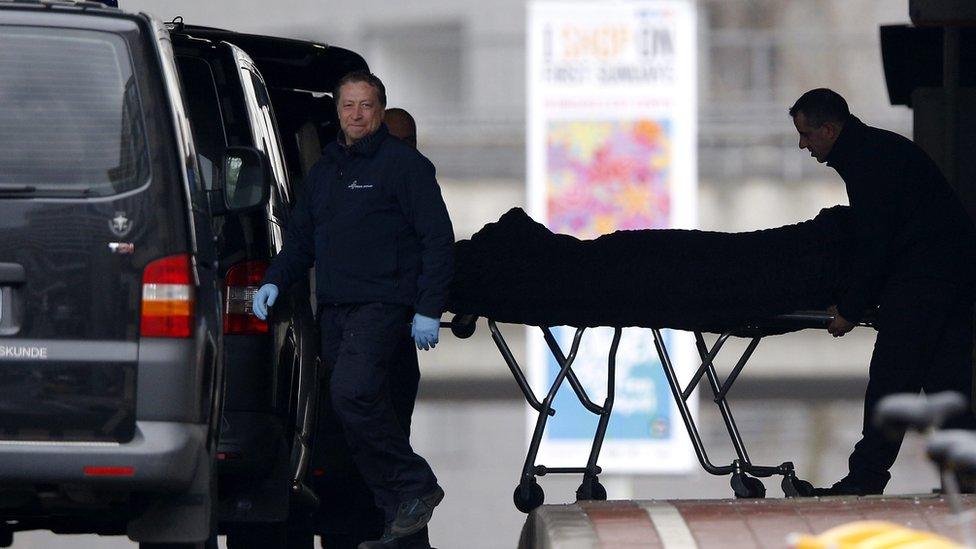
The Brussels bombings on 22 March killed 32 people and injured dozens more
Belgian police have arrested a suspect believed to be among the most wanted Islamists since the November attacks in Paris and last month's Brussels attacks.
Mohamed Abrini was among several arrested on 8 April, Belgian state broadcasters VRT and RTBF said.
Belgian prosecutors have not confirmed whether he is the "man in the hat" spotted in CCTV footage recorded before the Brussels airport bomb blasts.
A clear connection has emerged between the men who carried out the Brussels airport and metro bombings and those behind the Paris attacks. So-called Islamic State (IS) claimed it carried both out.
Soon after the 13 November gun and bomb attacks in the French capital, it became evident that several bombers had come from Belgium and that some of the bombs had been made in a flat in Brussels.

Mohamed Abrini
The trail for this Paris attacks suspect appeared to have gone cold, but he was confirmed arrested on 8 April.
He was a childhood friend of Salah Abdeslam, from Molenbeek in Brussels. Abdeslam was arrested just days before the 22 March Brussels attacks. Salah's brother, Ibrahim, blew himself up in the Paris attacks.
Before the Paris attacks, Abrini, 31, twice drove with the Abdeslam brothers from Belgium to Paris and back on 10 and 11 November.
He was seen at a petrol station on the way to Paris driving a Renault Clio car that was used on the night of the attacks.
He is suspected of having played an active role in the Brussels attacks too.
He is of Belgian-Moroccan nationality and travelled to Turkey last year, according to VRT. He is also suspected of having gone to Syria.
His younger brother, Souleymane, joined IS in January 2014, and died eight months later. Mohamed Abrini has been convicted on several occasions, mainly for robbery, and has served time in prison.
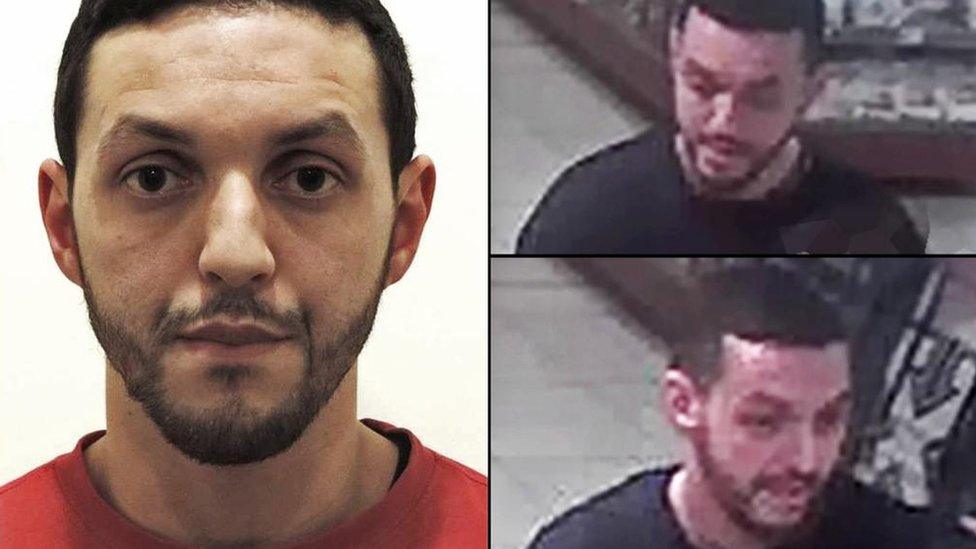
Abrini was captured on CCTV (R) at a service station at Ressons in northern France while driving a car with Paris suspect Salah Abdeslam

Salah Abdeslam
Salah Abdeslam, 26, was said to be intricately involved in the planning and execution of the Paris attacks. He then went on the run for four months before being captured in Molenbeek on 18 March.
It is suggested he was part of the IS Belgian cell preparing attacks timed for Easter but when he was caught they were brought forward. Police made clear he was providing information and his jihadist collaborators will have worried that their cover had been blown.
Before the Paris attacks, Abdeslam made several trips across Europe and has been seen as the logistics expert at the centre of the IS cell and its web of hideouts across Belgium.
He was stopped by police in the south-west German town of Ulm in early October with another suspect, with the false name of Monir Ahmed Alaaj. Alaaj, also known as Amine Choukri, was caught with Abdeslam last month.
Abdeslam was initially co-operative after his arrest, police said, but since the Brussels attacks has invoked his right to silence.

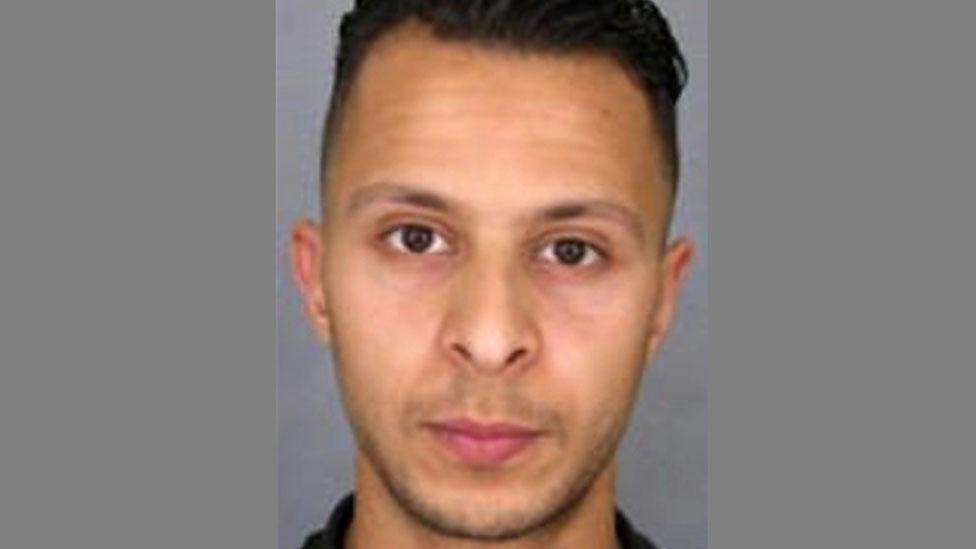
Salah Abdeslam was arrested on 18 March

Najim Laachraoui
The day before the Brussels bombings, Belgian police named Najim Laachraoui, 24, as a major suspect on the run after the Paris attacks.
A Belgian from the Brussels suburb of Schaerbeek, Laachraoui may have been the weapons expert for an IS cell in Belgium.
DNA has shown him to be one of the two bombers who attacked Zaventem airport on 22 March - the other was Ibrahim el-Bakraoui.
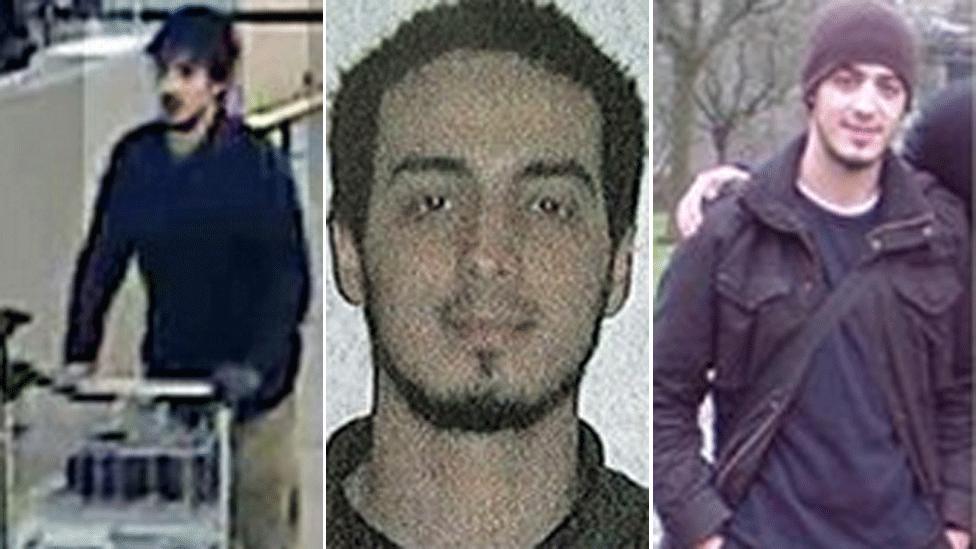
Belgian reports say Najim Laachraoui (C and R) blew himself up, moments after he was captured with the other bombers on CCTV
Laachraoui's DNA was found in a Brussels flat and in a house at Auvelais in southern Belgium, which were both used by the Paris bombers before the 13 November attacks.
Previously he had only been known by an alias, Soufiane Kayal. He had rented the Auvelais house using the false name.
His DNA traces were also found on a suicide vest, on a piece of cloth at the Bataclan concert hall in Paris and on an explosive device at the Stade de France - one of the other sites hit in Paris on 13 November 2015.
Laachraoui joined IS in Syria in 2013 and came back to Belgium last year.
He was in a car with two other key figures when they were stopped by police on the Hungarian border with Austria in September and allowed to continue the journey. One was Salah Abdeslam, the other Mohamed Belkaid.
The three were together on 15 March, when police raided their house in Forest, southern Brussels, and shot dead Belkaid.

Khalid and Ibrahim el-Bakraoui
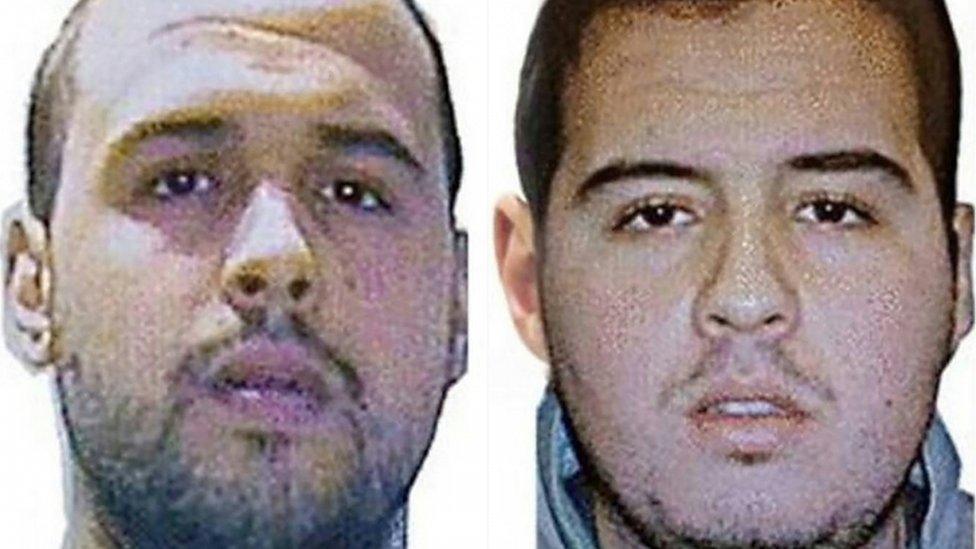
Khalid (L) and Ibrahim el-Bakraoui, both believed to have been suicide bombers
These two brothers, both convicted criminals, blew themselves up on 22 March, Ibrahim at Zaventem airport and Khalid on a metro train at Maelbeek station.
Belgium had for years viewed them as common criminals. Ibrahim el-Bakraoui was jailed for nine years for robbery involving a gun in 2010 and his brother was given five years for carjacking in 2011.
But the Turkish president has suggested that Ibrahim el-Bakraoui, 29, was picked up on the border with Syria in July 2015 and that Belgium was warned he was a "foreign terrorist fighter" before he was deported from Turkey. And there are clear connections to the Paris attacks and Salah Abdeslam.
Khalid el-Bakraoui, 27, rented the Brussels flat where Belkaid was shot dead on 15 March. Police had been hunting the Bakraoui brothers when they raided the flat in Rue du Dries in the Forest area of the capital.
Importantly, Khalid el-Bakraoui is also thought to have rented the flat at Charleroi in southern Belgium which was used as a rendezvous by the Belgian cell taking part in the Paris attacks.
Traces were found in the Rue du Fort flat in Charleroi of both Abdeslam brothers and Stade de France bomber Bilal Hadfi, as well as suspected ringleader Abdelhamid Abaaoud and Chakib Akrouh, who both died during a raid by Paris police five days after the attacks.
While one or both may have played a minor role in the Paris attacks, their involvement establishes a clear link between Salah Abdeslam, Najim Laachraoui and the Brussels bombings.
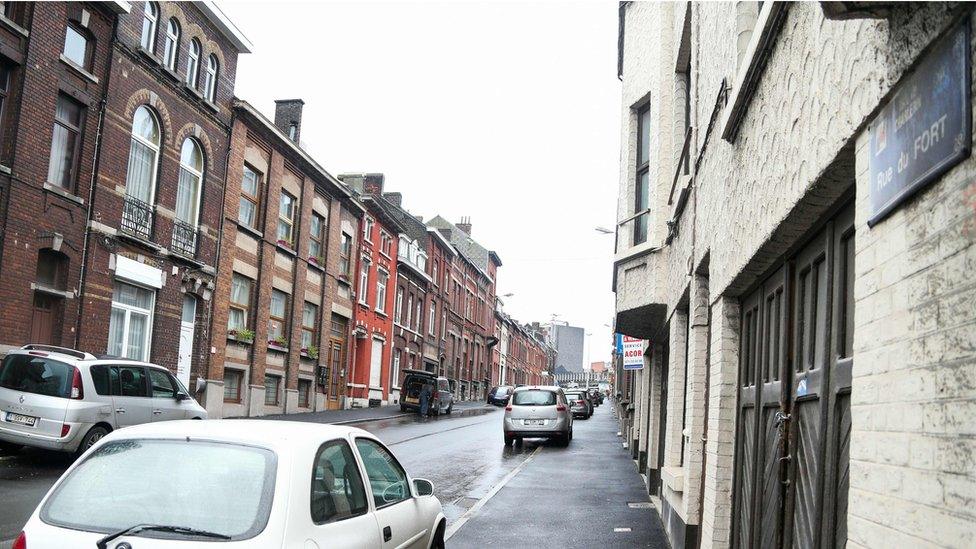
A flat on the Rue du Fort is now being seen as a key hideout for the Paris gunmen in the hours before the attacks
